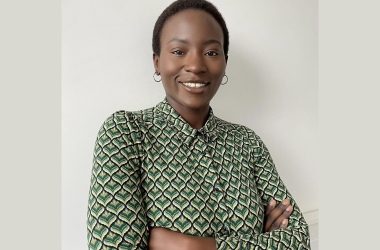Entrepreneurship in the Developing World: Research Delves into Cameroonian Experiences

Laetitia Ngum’s Graduation Assignment Focuses on Student Perspectives
With social entrepreneurship becoming more popular worldwide, Wittenborg graduate Laetitia Ngum chose to focus her graduation assignment on how Cameroonian students from the Catholic University Institute of Buea (CUIB) understand and approach the concept.
Laetitia, who is originally from Cameroon, recently completed a Bachelor of International Business Administration (IBA) in Entrepreneurship & Small Business. Before starting her programme at Wittenborg, she spent nine months studying at CUIB. The graduate explains that social entrepreneurship is especially relevant in Cameroon, where high unemployment has led many young people to start their own businesses as a way forward.
“While I was studying entrepreneurship at the Catholic University Institute of Buea, there was a lot of encouragement to start your own enterprise and to see the social challenges we face not as limitations, but as opportunities. Later, I went to study in Gambia, and I saw that people there also had this drive to start enterprises to help tackle social issues. When I moved to the Netherlands, I noticed that social entrepreneurship is viewed differently, more well-defined, and I became intrigued to know how it is approached in developing countries,” Laetitia says.
She adds that she has been involved in social entrepreneurship initiatives and volunteered on a friend’s project in Gambia that taught women how to weave and create handcrafted items to be sold online. “Although my friend lived in Gambia, she was originally from Ghana, so for me, it was a chance to learn more about other cultures and put what I had learned at school into practice. I helped her develop the business and, in the end, it turned into an NGO that supports women.”
To gather information for her study, Laetitia used both a survey and interviews with students from the Catholic University Institute of Buea. Her questions addressed topics such as students’ awareness and attitudes toward social entrepreneurship, their understanding of what it means and whether they believe they have the skills to undertake such a project.
Her research finds that, among Cameroonian students, the understanding of what social entrepreneurship is varies widely. “In general, there’s a more flexible understanding of what entrepreneurship is like. People view it in different ways influenced by their own educational and life experiences. Overall, there is a sense that social entrepreneurship includes other kinds of entrepreneurship in Cameroon, because even if entrepreneurs are profit-driven, they are also concerned with helping their communities. Meanwhile, in developed countries like the Netherlands, the distinction between entrepreneurship and social entrepreneurship is clearer.”
Laetitia believes that the Cameroonian government should seek to understand how social entrepreneurship works and how it can be promoted as a means to support the country’s development. “There already seems to be a strategy by the government and higher education institutions to encourage the youth to find innovative ways to deal with the unemployment crisis. And people are starting enterprises that offer creative solutions to the country’s problems. So, it’s a two-way street. They want to do well, but they also want their communities to thrive.”
For Laetitia, the most rewarding part of her research was conducting interviews with students. “I gained many valuable insights from them, and it was very enlightening because, as a Cameroonian studying in the Netherlands, I was able to view entrepreneurship in my home country from a different perspective. It was a great learning opportunity, and it reminded me not to generalise; what’s happening in developed economies isn’t necessarily the same as what’s happening in developing countries. So, entrepreneurship initiatives must be adapted to the local context in which they’re implemented.”
The graduate advises current Wittenborg students working on their graduation assignments and theses not to shy away from seeking help from their supervisors. “My supervisor, Amy Abdul, was great. She helped me stay focused and not get carried away by my own line of thinking. I’m grateful for her support and proud of what I’ve achieved with this research.”
Regarding her future plans, Laetitia would like to pursue a Master of Science degree in food systems quality and control in Germany, Belgium or France. “After completing that programme and gaining more experience, I would love to return to Cameroon and start a company in the food industry to help provide nutritious meals for those facing hunger and poverty,” she points out.
WUP 11/09/2025
by Ulisses Sawczuk
©WUAS Press